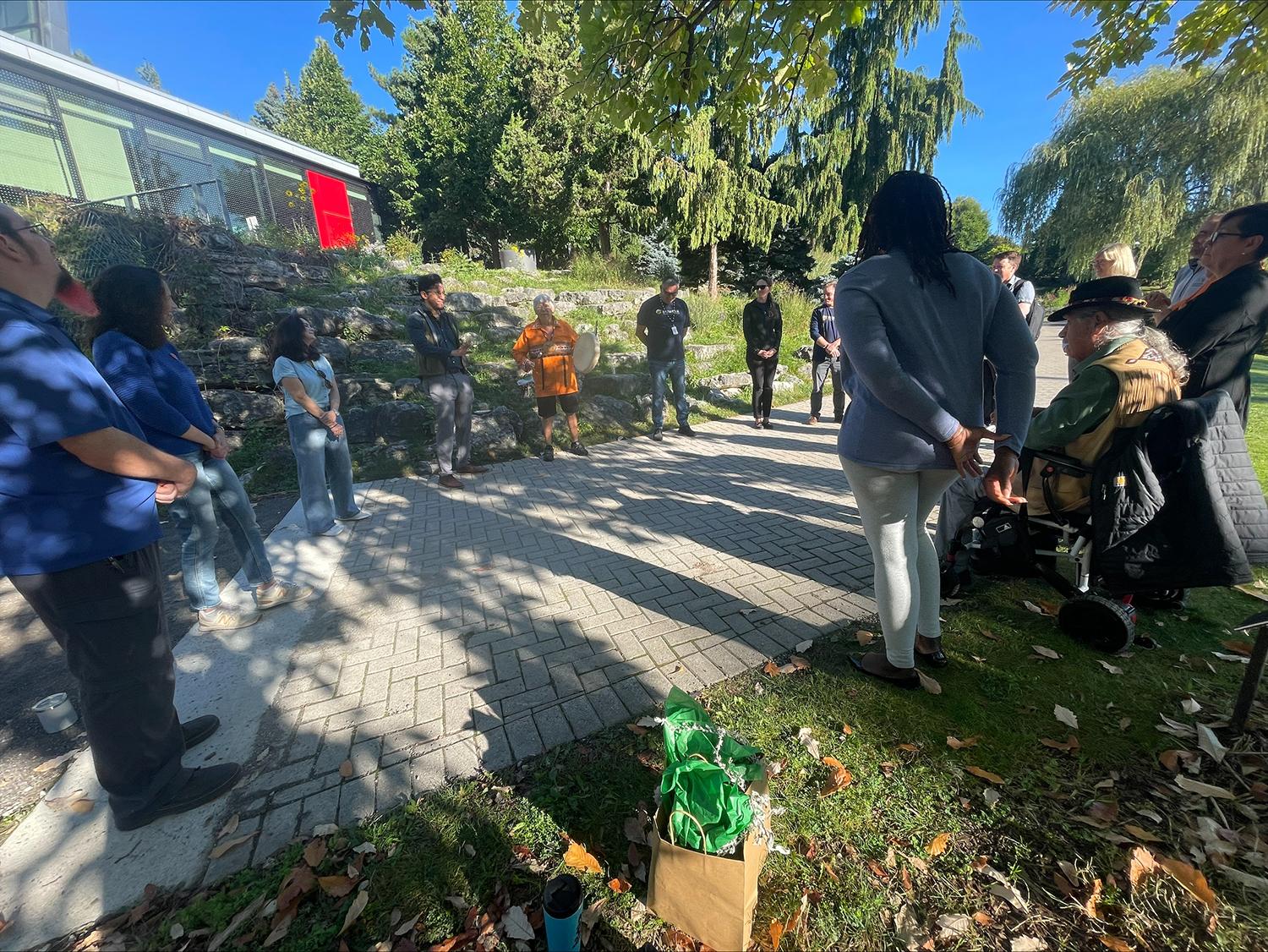
Members of the Humber Polytechnic community gathered for a sharing circle to celebrate and recognize Humber’s contribution to ongoing work supported by the Lawson Foundation on the importance of outdoor and Land-based play in early learning and childcare (ELCC).
Humber’s Early Childhood Education course Land-Based Play and Co-Learning Through Etuaptmumk/Two-Eyed Seeing was one of eight projects supported in the Lawson Foundation’s Outdoor Play Strategy 2.0. These projects were designed to build and measure adult capacity to impact outdoor play in ELCC and nurture systemic change as outlined in Transforming Post-Secondary Early Childhood Education in Canada with Outdoor and Land-based Teaching and Learning. The report provides guidelines to help integrate outdoor and Land-based teaching and learning in post-secondary ECE programs across Canada, aiming to get faculty, students and children outdoors and connected to nature and the Land.
The work also contributed to the Lawson Foundation’s newly launched framework, More Than a New Course: A Framework for Embedding Outdoor and Land-based Pedagogies in Post-Secondary ECE Programs. Building in part upon the work at Humber and drawing on the expertise of an Indigenous and non-Indigenous working group, the framework provides guidelines to help integrate outdoor and Land-based teaching and learning in post-secondary early childhood education (ECE) programs across Canada. The aim is to get faculty, students and, ultimately, children (and by extension their families and communities) outdoors and connected to nature and the Land.
Louise Zimanyi, an ECE professor and co-director of the project at Humber, said both the report and framework address an evidence-based gap and highlight how Humber’s work is a leader and model for post-secondary ECE across the country.
“The journey and impact of this work illustrates the importance of an ecosystem approach for ongoing relationship building and sustainability within contexts that are dynamic and evolving,” said Zimanyi.
The Land-Based Play and Co-Learning Through Etuaptmumk/Two-Eyed Seeing course is shaped by the traditional territories and lands on which Humber is located, is co-taught by Indigenous and non-Indigenous faculty, and is supported by Humber’s Indigenous Education & Engagement department as well as local and regional Indigenous Elders, Knowledge Holders, mentors and storytellers.
It engages learners and faculty in respectful, reciprocal, and responsible Land-based relationships and experiences in the Humber Arboretum including storytelling, teachings, co-learning and reflection, in all seasons and weather.

“As an Early Childhood Education student taking this course, it is important for us as adults to reconnect to nature so we can in turn support children and families to know the stories of what is around us, what we depend upon,” said Humber ECE student Marjorie Joseph. “I’m from the island of Bahamas that is vulnerable to climate change and we must see how we are inter-connected to understand how to be a good ancestor now and for seven generations ahead. Furthermore, as an educator, the knowledge I impart on children will make a pathway for the new leaders of sustainability that will address issues that affects us globally and to continue the work that we have started today.”
Mi’kmaw Elder Albert Marshall from the community of Eskasoni in the Traditional Territory of Mi’kma’ki, Cape Breton, attended the sharing circle. Since meeting in early 2020, Marshall and Zimanyi have been walking together and co-learning, building on Land-based work at Humber. This includes being part of a Knowledge and Research Collective along with co-director of the project, Lynn Short, and faculty members, Bora Kim, Cara Loft, Maya-Rose Simon and Olga Rossovska, to co-create, deliver, and evaluate the Land-based play course.
“The work undertaken at Humber could be a model for other institutions,” said Marshall.
Elder Mark Sault, Mississaugas of the Credit First Nation, also attended the sharing circle as did Jason Seright, vice-president of Inclusion & Belonging and Student Experience at Humber. Seright thanked the elders for joining and said it was a rare opportunity to have two venerable knowledge holders sit with them in such a way.
The Lawson Foundation is a Canadian family foundation that invests in and engages with ideas, people and organizations that contribute to the healthy development of children and youth.